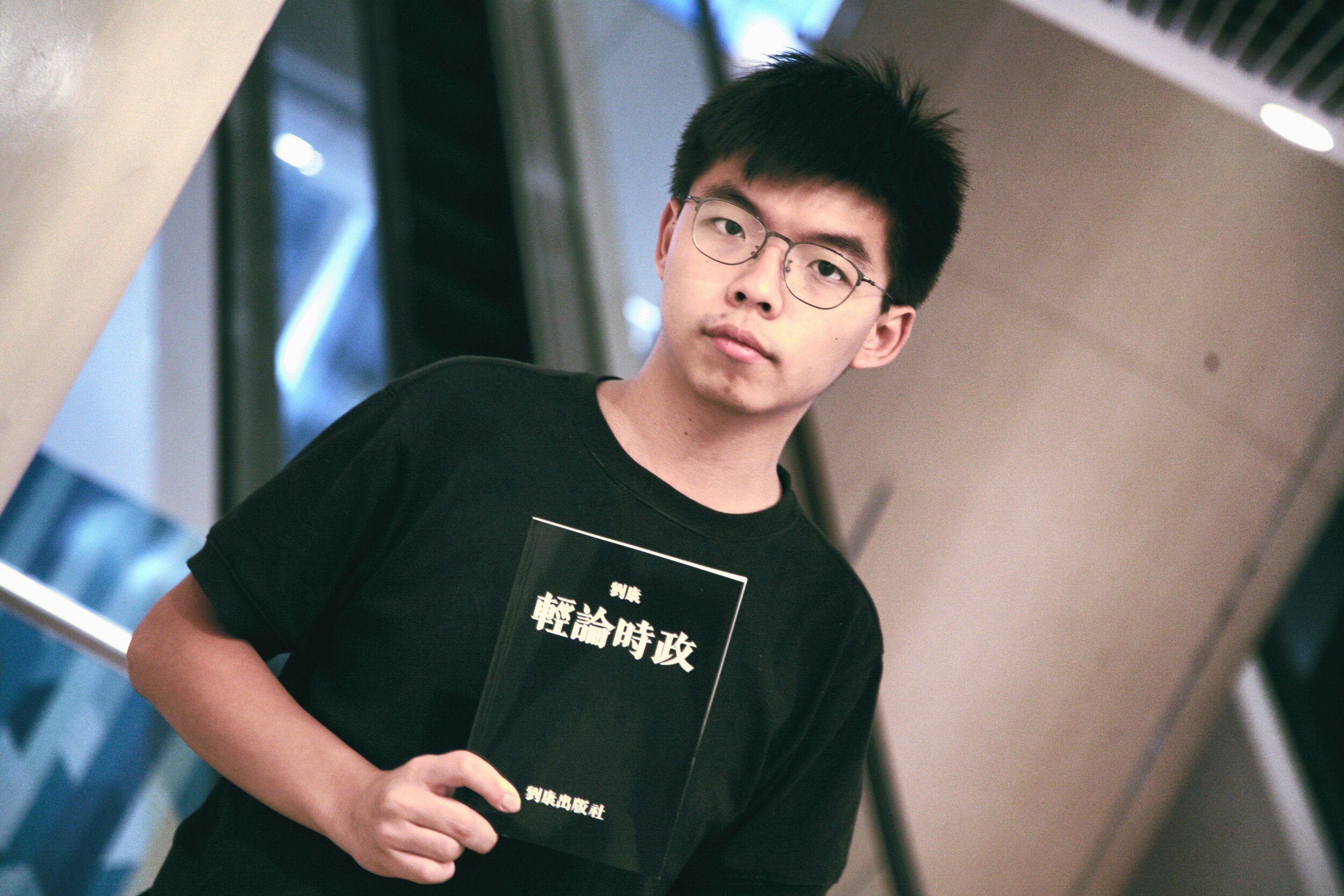An Interview with Joshua Wong: “We Need the World to Focus”
Joshua Wong holding a book by fellow democracy activist Honcques Laus. Photo.
Joshua Wong, 23, is arguably Hong Kong’s most prominent pro-democracy figure. Imprisoned twice for his political activities, he has continued to oppose what he characterizes as China’s increasingly authoritarian rule in Hong Kong. After leading the pro-democracy Umbrella Movement protests in 2014, he co-founded Demosistō, a political party. The party disbanded in June after the passage of a new national security law.
The new law imposes stiff punishment, including penalties up to life in prison, for activities including “separatism, subversion, terrorism, and foreign interference”, and grants jurisdiction to mainland courts for certain criminal cases. It has sparked massive protests and been criticized by democratic countries and pro-democracy activists as an erosion of Hong Kong’s fundamental freedoms, guaranteed under the “one country, two systems” policy in place since the territory’s handover to China in 1997. China has defended the move as being necessary to protect national security and maintain Hong Kong’s sovereignty as a Special Administrative Region of China.
On 31 July, Joshua’s campaign for election to Hong Kong’s legislature was blocked by the authorities. On 7 August, police charged him with “unlawful assembly” for participating in a vigil commemorating the Tiananmen Square massacre.
Following our exclusive publication of his article on Hong Kong’s “international front line,” I spoke to Joshua, who remains in Hong Kong, in a short addendum for the Columbia Political Review. We discussed the new law, democratic countries’ attitudes to Hong Kong, and the recent arrests of pro-democracy activists.
On 30 June, China’s government passed a national security law that now governs Hong Kong. You have been one of the most prominent critics of the new law. National security laws are a standard feature of many countries—why do you oppose the Hong Kong law?
The national security law in Hong Kong is kind of a speech-crime law, trying to silence the voice of the people with the threat of life sentencing. It’s just used to suppress the people who are fighting for press freedom and free elections. It’s not about national security—it’s about the security of the Communist authorities.
On 30 July, you and 11 other pro-democracy candidates were disqualified from running in election to the Legislative Council, Hong Kong’s state legislature. To justify their decision, election authorities cited your opposition to the national security law. The election has since been cancelled. What was your intention in running, and how will you respond to your disqualification and the election’s subsequent cancellation?
The disqualification implies political censorship. The world is watching and is aware of these double standards, and of the suppression and crackdown by Beijing. I’m not sure whether I can appeal, because the election has been cancelled directly [by Hong Kong’s government].
Anti-extradition protests in Hong Kong in 2019. Photo by Studio Incendo.
There has been a crackdown on pro-democracy activists. Your former Demosistō colleague Nathan Law has fled to London, while another, Agnes Chow, was arrested. Prominent opposition businessman Jimmy Lai was also jailed. Are you not afraid of being imprisoned again, particularly given the charges Hong Kong police have recently filed against you?
I will continue to fight until the last minute. I’m not surprised [by the crackdown]—they will continue to arrest us. I think that’s no reason for us to give up, and in such an uphill battle we will continue to stand with fellow Hong Kong protestors. I have no hope towards the government, but I have hope towards the people. [Hong Kong’s chief executive, Carrie Lam] should not be the one to crack down on Hong Kong’s freedoms, but she is just a Beijing loyalist.
When you spoke here at Columbia last September alongside fellow activist Brian Leung, you argued that “World leaders and the international community have a say on Hong Kong’s future.” How do you rate the responses of Western democracies to the developments in Hong Kong? What role do you believe they have to play?
It’s not just about political rights—it’s about the fundamental freedoms that are being eroded, just like how police stormed into the headquarters of Apple Daily, one of the most prominent newspapers. So I think that’s really important—we need the world to focus on it. Certain countries may have different diplomatic concerns, but it’s time to reassess their foreign policy towards Hong Kong.
Aditya Sharma is staff writer at CPR and a rising senior studying Political Science and English in the dual B.A. Program with SciencesPo. In normal times, you could probably find him getting coffee in Butler. Talk to him about fiction, free speech, and politics in India, Britain, and Europe.


